CQN continues its enthralling and EXCLUSIVE extracts from Alex Gordon’s book, ‘That Season In Paradise’, which takes us through the months that were the most momentous in Celtic’s proud history.
Today, we look at another dramatic chapter in the players’ club and country exploits on their way to never-ending glory.
JIMMY JOHNSTONE took a knock against the Czechs and was forced to withdraw from the Scotland team that was due to play world champions England at Wembley the following Saturday. Stevie Chalmers, as first reserve, expected to get his team-mate’s No.7 jersey, but new international manager Bobby Brown had been so impressed by Wallace’s two-goal salvo against Dukla that he was brought in and immediately given the right-wing role.
Ronnie Simpson’s wonderful fairy tale continued as the Scots triumphed 3-2 in front of a crowd of 99,063. There might have been some English fans in attendance, but they were rarely seen and certainly not heard. Brown, the first-ever full-time manager appointed by the Scottish Football Association, awarded the Celtic keeper his first international cap at the age of thirty-six – fifteen years after playing at Wembley and helping Newcastle United to a 1-0 English FA Cup victory over Arsenal. A relatively unknown forward who had failed to make the grade at Chelsea, Jim McCalliog, at the age of twenty, became the first Sheffield Wednesday player to be capped by Scotland in forty-seven years.

Bobby Lennox and Tommy Gemmell completed the Parkhead quartet for football’s piece de resistance. The defender recalled, ‘You could have written Bobby Brown’s pre-match tactics on the back of a stamp and still have had space left over. In short, there weren’t any. Of course, I was used to Jock Stein meticulously planning for all our games. It didn’t matter if it was Real Madrid or Raith Rovers, you knew exactly what you had to do when you went on the pitch against your opponents.
‘To be fair to Bobby Brown, if we didn’t already know what were about to face at Wembley that day we must have been living on the moon for a year or so. We got England rammed down our throats constantly after they won the World Cup. According to the scribes across the border, we were wasting our time even turning up for the game. Apparently, it would have been easier to nail jelly to a wall than to believe we would win. It was a foregone conclusion.
‘The bookmakers rated us as 7/1 against and, as we all know, these guys rarely got it wrong. They might just have lowered those odds had they been in the Scottish dressing room that day. I sensed a real ‘we’ll-show-’em’ attitude from my team-mates. Absolutely no disrespect to Bobby Brown, but we didn’t really need a manager that wonderful afternoon. The atmosphere was electric.
‘We were in London to do the business and shut up the English once and for all. We didn’t need anyone to stoke the fires in our belly for this one. There was no point in any motivational speaking. In fact, there was no point in tactics. Every single Scot in that dressing room was puffed up and ready to go long before the kick-off. We all knew what we had to do. I do admit the adrenalin was pumping a wee bit fiercer than normal.
‘They had gone nineteen games unbeaten until they came up against us that afternoon. No doubt they were confident of extending that run against a bunch of no-hopers. Didn’t quite work out that way, did it? The Celtic players were getting used to creating a sensation or two that season.’
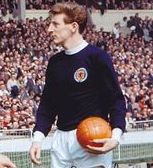
WEMBLEY WONDERLAND…Tommy Gemmell strolls onto the pitch before the 3-2 win over world champions England in April 1967.
Willie Wallace revealed he was more than just a little surprised to receive the telephone call to tell him to pick up his boots and join the international players just two days before the Wembley extravaganza. ‘Amazed? You could say that. I hardly had time to draw breath. It was unfortunate for Jinky, but it opened the door to me and presented me with a truly memorable occasion. I was playing through the middle at Celtic, but I was asked to take Jinky’s place on the right against England. That might have seemed strange to some, but, in fact, I had played outside-right on a few occasions for Hearts before moving to Parkhead.
‘Happily, I was involved in our first goal when I fired in a low shot from the right side of the penalty area. Gordon Banks went down and got a hand to it, but couldn’t hold the attempt. He spilled it and that was all Denis Law needed to swoop and put the ball away. Denis’s reflexes in the box were like lightning. Make a mistake when this lad was around and you would be punished. He was incredible. Banks must have had that sinking feeling as soon as the ball bounced from his grasp. It came back to Denis at a fair pace, but he didn’t even break stride as he walloped it into the net.’
England’s world-class keeper Banks recalled, ‘The Scots really had themselves stoked up for that match and we knew they were ready to run through brick walls for victory. As far as Scotland were concerned, this was the World Cup Final. Denis Law scored their first goal from a rebound after I had pushed out a shot from Willie Wallace. Twelve minutes from the end, Bobby Lennox, who had been giving George Cohen a lot of problems on their left wing, made it 2-0. Jack Charlton pulled a goal back almost immediately and then I let in a bad goal from Jim McCalliog. I committed the cardinal sin of not guarding my near post properly as I came out to meet him after he had evaded two half-hearted tackles. Geoff Hurst made it 3-2 and we nearly scrambled an equaliser in one of the most dramatic finishes to an England v. Scotland match.’
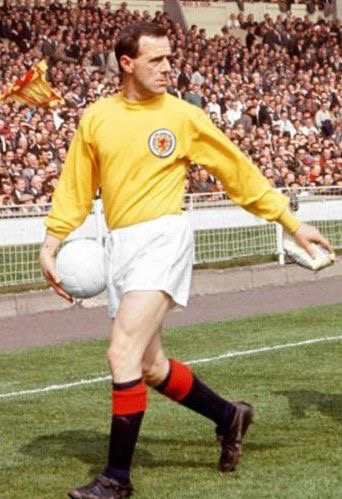
DEBUT BHOY…Ronnie Simpson, at the age of 36, makes his first appearance for Scotland.
Remarkably, there had been opposition from some quarters to Ronnie Simpson getting the No.1 position in front of Bobby Ferguson, who was on the verge of leaving Kilmarnock for West Ham for a record £65,000 fee for a keeper in the summer. Bobby Brown, a former Rangers goalie, stuck firmly to his guns about the decision to bring in the thirtysomething Celt.
He said, ‘I knew Scotland had a problem in that position. I had witnessed it first-hand on several occasions. I thought it was time for a change and not for one moment did I ever think Ronnie Simpson would let us down. He was a reliable, safe pair of hands. He also had experience of the Wembley pitch after having played there twice for Newcastle United in the early Fifties, so the ground would hold no surprises for him.
‘To my mind, he was the most consistent goalkeeper around at the time and it was hardly a risk putting him in against England. I didn’t care what age he was; I was only ever interested in ability. Anyway, he must have been doing something right if Jock Stein picked him for Celtic week in, week out.’
Afterwards, in the jubilant Wembley dressing room, Gemmell recalled, ‘Faither was genuinely upset that England had managed to score two goals in the last six minutes or so. That underlined the perfectionist in our goalie. We had just had a very famous victory over the reigning world champions, but, clearly, he hadn’t wanted to concede any goals. Some people are never happy!’

A wicked, wet and windy Wednesday evening in the grey east end of Glasgow provided the unlikely back drop for a heroes’ welcome for Celtic’s four Wembley victors, Ronnie Simpson, Tommy Gemmell, Willie Wallace and Bobby Lennox. Throughout a blustery day in the city, the rain had been incessant while ferocious gusts of piercing wind did little to assist the entertainment factor.
Aberdeen, for their part, showed little intention of providing anything by way of enjoyment for the 33,000 paying customers as their team boss Eddie Turnbull, no-one’s idea of a favourite uncle and a well-known antagonist of Jock Stein, set out ruthlessly to stop his opponents from playing. It had been billed as the dress rehearsal for the Scottish Cup Final at Hampden in twenty days’ time and the Pittodrie chief, clearly, wasn’t going to risk his team getting turned over.
If it was the Dons manager’s sole intention to ruin the game as a spectacle, he succeeded spectacularly. It was a non-starter as his players, with the exception of lone striker Jim Storrie, displayed an unfathomable aversion to crossing into the Celtic half of the field, especially after a nondescript opening forty-five minutes. So, there was no surprise that the game ended goalless and provoked the terse response from the Celtic boss of, ‘Well, at least, we’re a point nearer the title.’ He refused to elaborate.
A newspaper reporter noted that play throughout had been ‘scrappy and inconclusive’ and there had been a severe lack of ‘directness, thrust and accuracy’. Under the headline of ‘Celtic held to draw in featureless game’, he added, ‘From the restart, it was obvious Aberdeen would be content to settle for a draw. They set up a defence calculated to keep Celtic out and succeeded without undue strain. Altogether it was a frustrating occasion for the home supporters, who cannot yet be certain that their favourites will clinch the championship. Having played the same number of games as Rangers, thirty-one, Celtic are three points ahead of their nearest challengers, whom they have still to meet at Ibrox, having also to play Dundee United and Kilmarnock at Parkhead.’
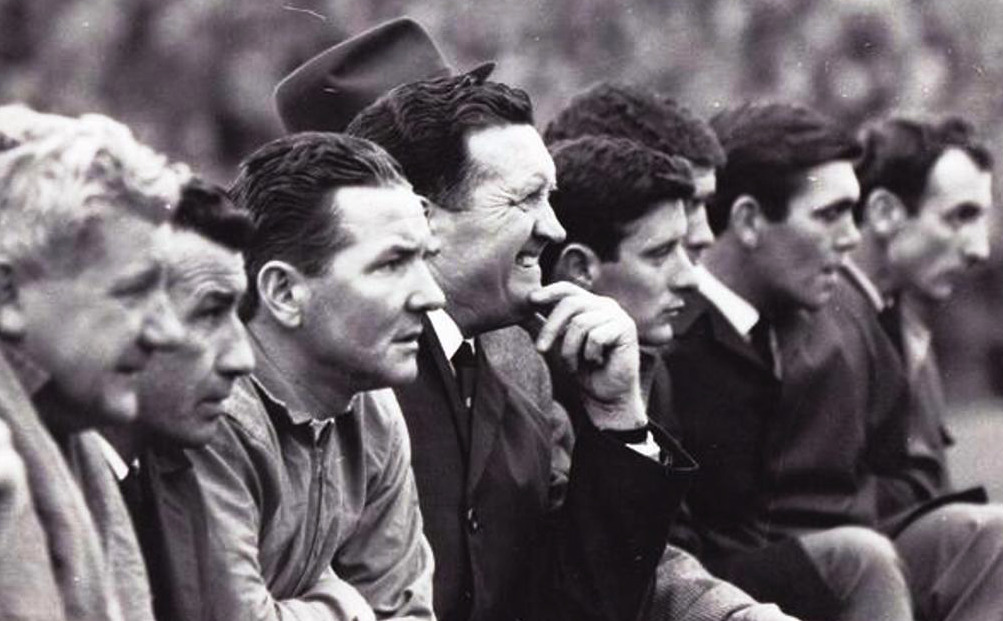
LOST IN THOUGHT…Jock Stein ponders the game as he sits on the bench in Prague.
On April 25, Celtic proved they, too, could put up the shutters when they cemented their place in that season’s European Cup Final with an uncustomary withdrawn performance against Dukla Prague in the Czechoslovakian capital city. The unsung hero was Stevie Chalmers, who spent a punishing ninety minutes being pummelled by a frustrated defence who couldn’t risk taking their eye of the eager Celtic attacker.
Chalmers remembered, ‘That was the one and only time I was banned from entering my own team’s half of the field. Big Jock laid it on the line, “Keep busy, Stevie. Let them know you’re out there.” Thanks, boss! I was never afraid to put myself about and, as I recall, a few players bumped into my elbows that afternoon. It’s a man’s game, after all. I just kept going for the entire game and the Dukla back lot weren’t pleased. It was one of the hardest shifts I ever put in, but we were ninety minutes away from the European Cup Final and if that doesn’t give you momentum then nothing will.
‘Obviously, Dukla wanted to give me a hard time. They tried to get me to retreat back into my own half beside my team-mates, but I was having none of that. I had a job to do and that was to get about their defence and keep them stretched. Not the most glamorous role in the team, I’m sure you’ll agree, but one that was vital in that game. The Czechs were a very good team and they liked to build from the back. They used their captain Josef Masopust a lot, passing the ball through the midfield. So, that’s where I came in. I was asked to harry them, chase them and make sure they didn’t get the opportunity to dwell on the ball.
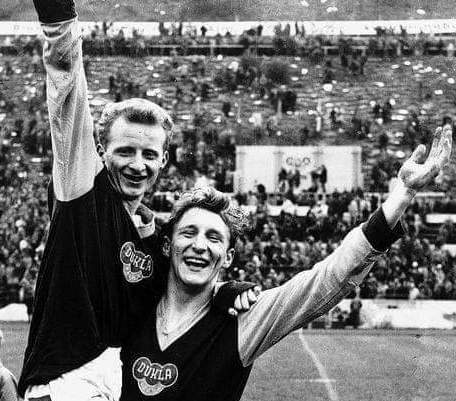
PARADISE IN PRAGUE…Jimmy Johnstone and Tommy Gemmell, in Dukla Prague shirts, celebrate the scoreless stalemate.
‘If that’s what Big Jock wanted, then that’s what Big Jock would get. I was desperate to stay in his first team. But Dukla did pin us back by their attacking play. They had scored that vital away goal and they must have thought a 2-0 win against us was within their scope. They may even have been heartened to know we had thrown away a three-goal advantage in Budapest against MTK in a European Cup-Winners’ Cup semi-final only three years earlier. But this was a different Celtic team with an entirely different attitude.
‘So, if Dukla believed they were about to face a collection of players who would collapse under pressure, then they were to be sorely disappointed. They may even have noted that we had also lost in our previous away game, the 1-0 defeat in Yugoslavia against Vojvodina. But we were learning all the time and we put our experience to a good use in Prague.
‘Ironically, Big Jock actually looked a bit disappointed at the end of that match. Sure, he was delighted that Celtic had become the first British club to reach the Final of the European Cup. However, he realised we hadn’t done it in our normal fashion. The flair, the attacking ambition, the adventure weren’t in evidence and those facets of our play were very important to him.
‘Afterwards, he gathered us around him in the dressing room and said, “We will never play like that again. I will never ask you to play all-out defence again.” If we were defending in games after that, it was because we were being pushed back and never because it was a pre-arranged tactic.’
Billy McNeill, in commanding form throughout the tie, recalled, ‘What a game Stevie had in Prague. We felt a bit sorry for him. At one stage, late in the second-half, he got into a bit of bother and suddenly he was surrounded by about four of their players. We were too far away to lend him some support. Thankfully, the referee sorted it out!’

ALL ALONE…Stevie Chalmers is chased by a posse of Dukla players after an incident.
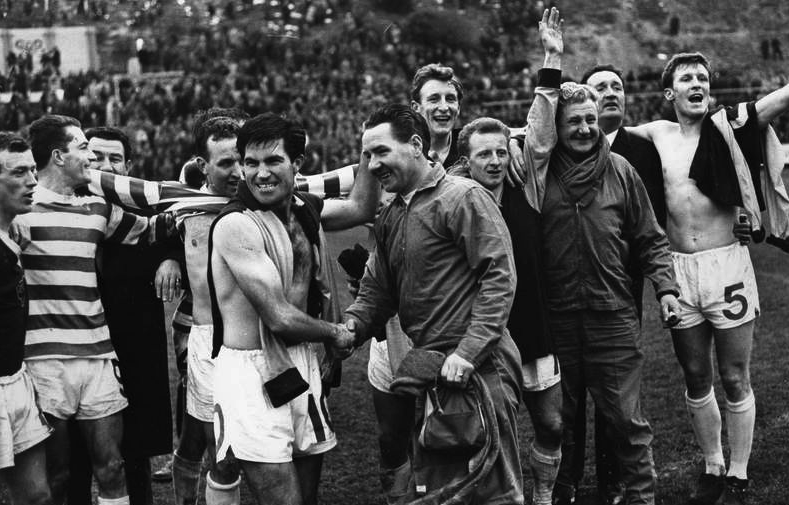
LISBON HERE WE COME…Bertie Auld and trainer Neil Mochan lead the celebrations in Prague.
Bobby Lennox added, ‘Big Jock had come up with a strategy that was foreign to all of us and we were going to make sure the backdoor was bolted firmly shut. My pal, Wee Jinky, just about played the entire game standing beside Jim Craig at right-back. I spent an awful lot of my ninety minutes keeping Big Tommy company over on the left. That’s not exactly how it was planned. Dukla, a fine team, pinned us back for lengthy periods of that game. They took control in front of their own fans and they made a real contest of it.
‘They made it hectic for all of us and we were forced to defend to the very end. The only guy who wasn’t given any defensive duties that day was Stevie Chalmers. I remember Big Jock telling him, “Chase everything.” And, you know, he did. From start to finish, Stevie put himself about all over the place. The Czech defenders must have hated the sight of him. He never gave them a moment’s rest. He was a one-man forward line. Somehow, it seemed so fitting that Stevie should get the winning goal against Inter Milan. He earned it with his exhausting stint in Prague.’
Ronnie Simpson didn’t remember being too flustered during the encounter. ‘The Dukla Prague coach Bohumil Musil admitted he had been very impressed by our performance in the first leg. However, he stressed his team of soldiers still had a chance in front of their own fans in the return. We didn’t try to be smart in Prague and set out to contain the Czechs. Just before we went out on to the pitch, for one of the most important games in our careers, Jock Stein told us, “Right, we’ve done our job. Now let’s see what Dukla can do.” He reassured us that he was convinced they couldn’t raise their game enough to upset us. He was right again.

GLORY BHOYS…Bobby Murdoch, Billy McNeill, Bertie Auld, Bobby Lennox, Stevie Chalmers and Tommy Gemmell celebrate in Prague.
‘They had a couple of shots which went close, but nothing more. They appeared to lack the speed required to beat our defence and we calmly settled for 0-0. The Boss was delighted. He even bought champagne for the Press and I got a half-bottle to myself – all over my suit when somebody opened a bottle behind me. But who cared? “We’re on our way to Lisbon, we shall not be moved!” we sang until our throats were dry.’
John Clark observed, ‘The Juliska Stadium has a nice ring to it, hasn’t it? That was Dukla’s ground and it was anything but pleasant. It was a foreboding, grey old place that could have done with a lick of paint. It looked as though the construction outfit who were putting it together got fed up halfway through and went home. The atmosphere wasn’t helped when it looked as though the entire Czechoslovakian Army was there, too. It could have been a terrifying experience, but, being only ninety minutes away from the European Cup Final, we were prepared for anything.

‘Jock, of course, went against all his principles and philosophies that day to play defensively and those poor Czech fans never saw the real Celtic on that occasion. They must have been more than just a bit bemused when they saw us perform against Inter Milan; surely they didn’t believe they were witnessing the same players or the same team.
‘I think even wee Jimmy Johnstone was given defensive duties against Dukla. Can you imagine the Wee Man as cover at right-back? Me, neither, but that’s where he played for the entire game. We were helped, too, with the presence and reassurance of the experienced Ronnie Simpson behind us. His was the fairytale to end all fairytales and he wasn’t going to allow anyone to take it away from him. He talked us through that game as only he could. When the Czechs got through and, thankfully that wasn’t too often, Ronnie was there to pull off the save.
‘The Dukla players were gracious in defeat, but I do remember Masopust being a bit grumpy. He had played in a World Cup Final in 1962 and now, in his mid-thirties, he must have been looking forward to an appearance in a European Cup Final. Sorry, Josef, we were in no mood to be denied our place in Lisbon.’
Now for the little matter of the Scottish Cup Final.
TOMORROW: Big Jock’s Hampden masterplan.

